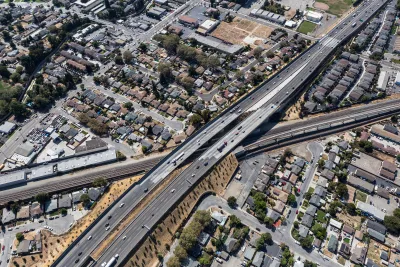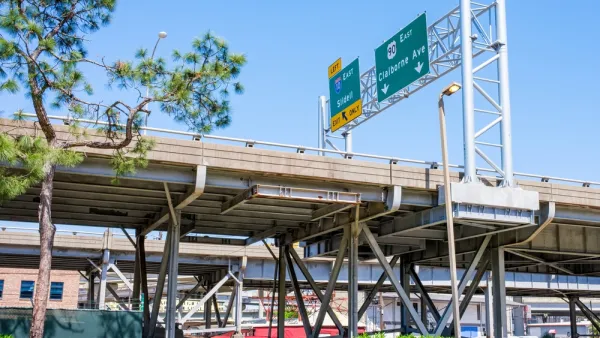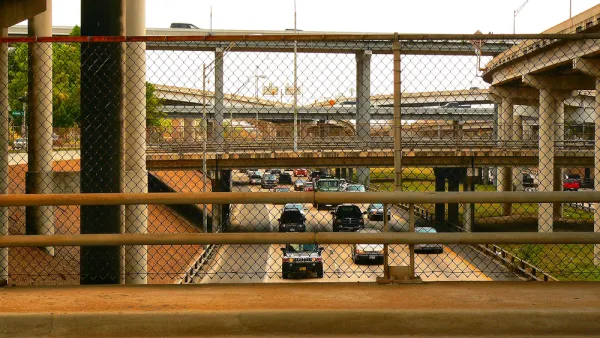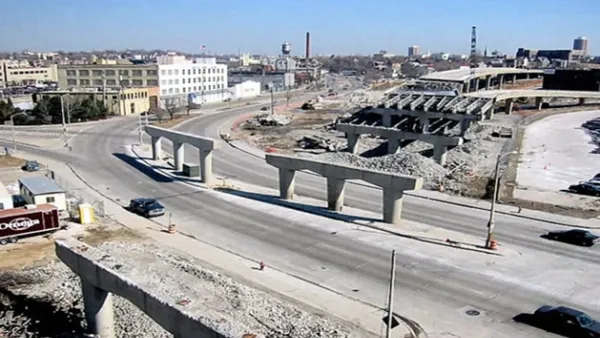The Biden administration has pledged to correct the damage imposed on communities by highways and infrastructure, but many projects are only committing to minor improvements, not transformative changes.

Recognizing the impacts of rampant highway construction and other infrastructure on urban neighborhoods and communities of color, the Reconnecting Communities Act and other recently created federal programs aim to redress the damage. Writing in The New York Times, Mark Walker describes the Biden administration’s efforts “to address racial disparities resulting from how the United States built physical infrastructure in past decades.”
As Walker explains, “The Transportation Department has awarded funding to dozens of projects under the goal of reconnecting communities, including $185 million in grants as part of a pilot program created by the $1 trillion bipartisan infrastructure law.” But “Once you wreck a community, putting it back together is much more work than just removing an interstate,” says Transportation for America director Beth Osborne.
Walker describes one such effort in Kansas City, where $5 million in federal funding is fueling planning for pedestrian overpasses and transit infrastructure to improve conditions around U.S. Highway 71, which “displaced thousands of residents and cut off predominantly Black neighborhoods from grocery stores, health care and jobs.” The city doesn’t envision removing the highway altogether, but rather adding connections to safely link the neighborhoods on either side.
FULL STORY: Highways Have Sliced Through City After City. Can the U.S. Undo the Damage?

National Parks Layoffs Will Cause Communities to Lose Billions
Thousands of essential park workers were laid off this week, just before the busy spring break season.

Retro-silient?: America’s First “Eco-burb,” The Woodlands Turns 50
A master-planned community north of Houston offers lessons on green infrastructure and resilient design, but falls short of its founder’s lofty affordability and walkability goals.

Delivering for America Plan Will Downgrade Mail Service in at Least 49.5 Percent of Zip Codes
Republican and Democrat lawmakers criticize the plan for its disproportionate negative impact on rural communities.

Test News Post 1
This is a summary

Test News Headline 46
Test for the image on the front page.

Balancing Bombs and Butterflies: How the National Guard Protects a Rare Species
The National Guard at Fort Indiantown Gap uses GIS technology and land management strategies to balance military training with conservation efforts, ensuring the survival of the rare eastern regal fritillary butterfly.
Urban Design for Planners 1: Software Tools
This six-course series explores essential urban design concepts using open source software and equips planners with the tools they need to participate fully in the urban design process.
Planning for Universal Design
Learn the tools for implementing Universal Design in planning regulations.
EMC Planning Group, Inc.
Planetizen
Planetizen
Mpact (formerly Rail~Volution)
Great Falls Development Authority, Inc.
HUDs Office of Policy Development and Research
NYU Wagner Graduate School of Public Service





























